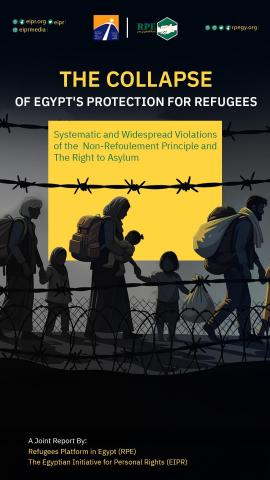The Collapse of Egypt's Protection for Refugees
Egypt is witnessing an unprecedented escalation in the violation of the rights of refugees, migrants, and asylum seekers. Mass arrests and refoulement campaigns increased significantly and escalated during 2024 and the first half of 2025, while the new and fundamentally flawed Asylum Law No. 164 of 2024 has been promulgated but is still inoperable pending the publication of executive regulations (by-laws), and in absence of any attempt to reconsider the most serious and flagrant issues in the law or attempt to rectify them in the bylaws by engaging stakeholders and experts.
These violations were not limited to Sudanese people fleeing the conflict but also affected refugees from South Sudan, Ethiopia and Eritrea, making access to protection and residency almost impossible. The crisis was exacerbated by the imposition of strict administrative and financial restrictions to obtain visas, increasing waiting periods for registration and residency to unprecedented lengths, pushing the majority into a state of ‘forced undocumentation,’ making them vulnerable to arrest and deportation at any moment, even for UNHCR document holders, as well as denying access to basic services and putting them at risk of exploitation without legal protection.
Egypt continues to delegate UNHCR to conduct registration, refugee status determination, and resettlement of refugees and asylum seekers residing in Egypt, while the government develops the by-laws for the heavily criticised1 law number 164/2024 (the new Asylum Law signed into legislation in December 2024)2. The government of Egypt has not engaged UN agencies or civil society in any meaningful process of developing the by-laws for the new national asylum law, despite repeated requests and vague promises on part of the government to take an inclusive approach to the development of the by-laws. In the first three months of 2025, we have witnessed state authorities ramp up targeting of refugees and asylum seekers in a campaign that is unprecedented in both its scale and methods. Authorities have targeted refugee communities through stops and checks on the streets targeting people seemingly on the basis of skin colour, under the guise of checking the legality of immigration papers.
These arrests, which sometimes involved up to 100 people in a single raid, led to numerous cases of detention and subsequent deportation. Many of the forcibly displaced people arrested had legal documents from the United Nations High Commissioner for Refugees (UNHCR), but this did not prevent the authorities from detaining them and deporting a large and growing number of migrants, refugees, and asylum seekers after confiscating their UNHCR documents or simply pretending they did not exist. In some cases, the authorities raided the homes of migrants, refugees, and asylum seekers in neighborhoods known to have large numbers of residents who are refugees or migrants, a practice that is almost entirely new to the Egyptian state's policies toward forcibly displaced people’s communities.
While it is difficult to confirm a direct causal link between these increasingly aggressive policies and practices against migrants, refugees, and asylum seekers and the ratification of the asylum law, there is definitely a correlation: the policy turn and unprecedented escalation has very neatly coincided in time with the passage of the law.
With the ratification of the law, including provisions that blatantly violate the 1951 Convention, it is evident that Egyptian authorities are building a structure—so far still confined to paper—that is designed to make access to asylum and protection extremely difficult and, more important, entirely subject to executive discretion and whim.
The scale and nature of targeting of migrants, refugees, and asylum seekers in the first three months of 2025 —in some ways unlike anything that we have seen in the last three decades—indicates that hundreds of thousands of migrants, refugees and asylum seekers are at immediate risk with their status largely disregarded by state authorities.
This joint report by the Refugee Platform in Egypt (RPE) and the Egyptian Initiative for Personal Rights (EIPR) aims to highlight cases documented by local protection agencies and civil society organizations on the ground in Egypt, demonstrating the systematic and deliberate nature of state authorities’ targeting of migrants, refugees, and asylum seekers. The report focuses on the worsening crisis facing hundreds of thousands of refugees and asylum seekers in Egypt, as well as new arrivals, by monitoring and documenting patterns of violations in hundreds of cases in which refugees were detained and deported without judicial review or due process guarantees - and in many cases with complete disregard for their legally protected status and asylum seekers or as recognised refugees.
Read the full report here
1 Refugee Platform in Egypt, In-Depth Analytical Study on the Draft Foreigners’ Asylum Law, (14 November 2024), available here;
Refugee Platform in Egypt, Policy Brief on the Draft Foreigners’ Asylum Law, (14 November 2024), available here.
2 Special Rapporteur on the human rights of migrants et al., Letter from group of Special Rapporteurs sent to the Egyptian Government concerning certain provisions of the recently adopted “Asylum Law”, (17 December 2024). Available here.




